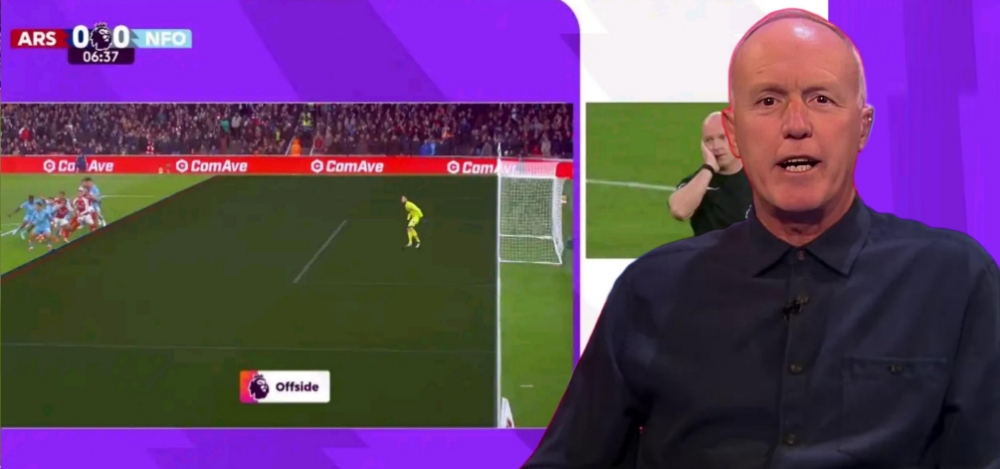AC Milan news
Arsenal’s victory against Forest highlights two significant VAR errors…

Arsenal’s victory over Nottingham Forest underscored two significant shortcomings in VAR that the Premier League has been slow to rectify in recent years.
The 3-0 triumph for Arsenal on Saturday masked some deficiencies in officiating, as numerous fans expressed dissatisfaction with referee Simon Hooper’s handling of yellow cards.
Hooper was quick to issue bookings in the first half, with three Arsenal players cautioned despite the team committing only four fouls collectively.
In the second half, when Hooper had the opportunity to show a second yellow card to Ola Aina, he opted not to, a decision that Leandro Trossard and Declan Rice might have wished for in previous matches.
However, the more pressing concerns were related to VAR, which has faced criticism for its shortcomings that should have been addressed long ago.
The first issue pertains to the absence of semi-automated offside technology, which has been operational in several top leagues for over two years but remains unavailable in England.
In the fifth minute, Arsenal’s Jurrien Timber thought he had scored the opening goal, converting a rebound after Mikel Merino’s header was saved.
Yet, it took VAR officials an extensive two minutes and 40 seconds to conclude that Merino was offside from the initial free-kick.
The introduction of semi-automated offside technology was anticipated to minimize such delays significantly.
The Premier League had set a timeline for its implementation, announcing in August that it would be “expected to be ready to be used from after one of the autumn international breaks.”
However, the September and October breaks have come and gone without any progress, and reports now indicate that the technology may not be available until at least the new year, with some club officials expressing concerns that it may not be introduced at all this season.
The September break came and went, followed by October, and now November has arrived, yet there has been no advancement.
Recent reports indicate that the technology’s rollout has been postponed until at least the new year, with some club officials expressing concerns that it may not be implemented at all this season.
A second VAR controversy emerged later in the match when Nottingham Forest netted an offside goal. Although the offside was clearly visible on the initial replay, the game was paused for over a minute for a VAR review.
However, during most of that time, VAR was not examining the offside situation. Instead, they were reviewing a potential red card for Callum Hudson-Odoi’s tackle on William Saliba.
The failure in this instance was the lack of communication to the fans in the stadium. While those watching on television were aware of what was being reviewed, the supporters present were left uninformed.
Despite discussions about new systems and processes to keep fans in the loop, those attending the match are still left in the dark regarding significant decisions.
For fans at the Emirates Stadium this weekend, it felt like yet another exasperatingly lengthy offside review.
There was no information displayed on the big screen to clarify the situation, and announcements over the loudspeakers remain absent from Premier League matches.
Arsenal supporters have had numerous reasons to voice their frustrations about refereeing this season, but Saturday’s game served as a reminder that the authorities are complicating matters unnecessarily.
-

 Arsenal News6 months ago
Arsenal News6 months agoBruno Guimaraes’ eight-word social media post causes a stir regarding a potential transfer move to Arsenal from Newcastle…
-

 Arsenal News8 months ago
Arsenal News8 months agoArsenal’s transfer plans for the summer include Edu’s pursuit of 4 new signings alongside the potential departure of 9 players.
-

 Arsenal News7 months ago
Arsenal News7 months agoLeandro Trossard has hit back at Roy Keane’s claims that Arsenal got ‘lucky’ in their win at Manchester United…
-

 Featured9 months ago
Featured9 months agoArsenal 2 — 1 Brentford final score, result, highlights as Kai Havertz sends Gunners top of Premier League…
-

 Arsenal News7 months ago
Arsenal News7 months agoAlexander Isak gives Arsenal the guarantee they need amid dream Declan Rice transfer repeat — Report…
-

 Arsenal News5 months ago
Arsenal News5 months agoArsenal in talks with Newcastle United over a potential swap deal as they aim to negotiate down the £100m valuation…
-

 Arsenal News10 months ago
Arsenal News10 months agoIan Wright praises Arsenal star’s exceptional performance against Liverpool today…
-

 Arsenal News7 months ago
Arsenal News7 months agoArsenal’s unbelievable £198m triple deal leaves Liverpool stunned and Manchester United disappointed…















